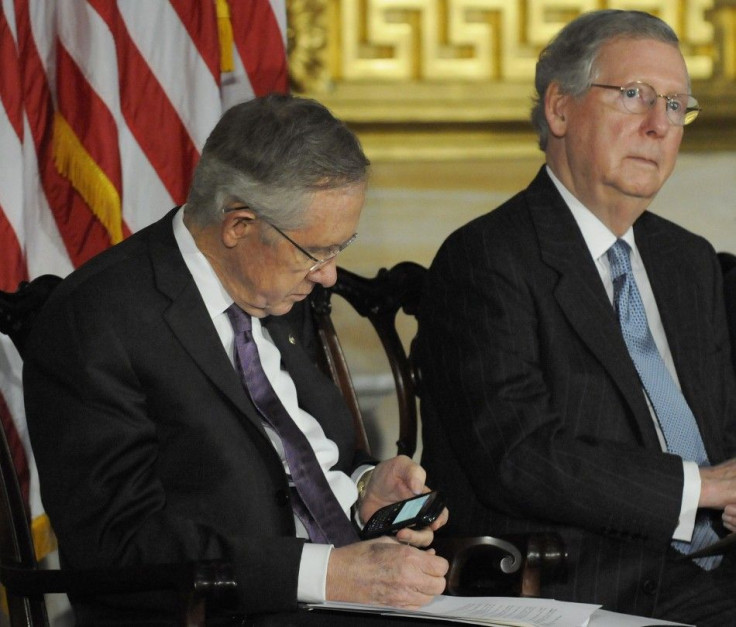Senate Leaders Optimistic Government Shutdown Will be Averted

The high-caliber pistol that is a government shutdown is being held against the Capitol's head, as both houses of Congress and the President wrangle over year-end legislation and spending bills, tying funding for government operations to a deal over the payroll tax cut. Senate leaders emerged Thursday morning expressing optimism that an agreement around the payroll tax cut and a spending bill will be made before Friday.
House Republicans introduced a $1.043 trillion spending bill in an effort to keep the government funded past a looming deadline on Dec. 16 when the current the temporary spending extension, a continuing resolution, is set to expire.
The skeletal necessities of a spending agreement were reportedly ironed out as early as Monday. The White House has made an extension of the payroll tax cut a top priority ahead of spending measures, tying the two together. Senate Democrats have towed the line and demanded a deal over the tax cut be reached first.
Majority Leader Harry Reid, D-Nev., started off the morning with remarks stating ongoing meetings with Minority Leader Mitch McConnell have been fruitful.
We're confident, optimistic we'll be able to resolve both on a bipartisan basis, said McConnell in reference to two bills, addressing a payroll tax cut and spending respectively.
The remarks by McConnell and Reid indicate a two-week stretch of partisan bickering over the bills may come to an end.
We've done enough back and forth-the Republican leader and me staking out our positions, and our positions are fairly clear to the American people, Reid said on the Senate floor. What we're going to try to do during the next few hours is work toward resolving some of the outstanding issues.
Senate Democratic aides have indicated the party's membership dropped their payroll tax cut proposal's most contentious measure, a surtax on incomes over a million dollars, according to the AP.
Absent Millionaire's Tax, Will Senate Republicans Support Deal?
With that major hurdle out of the way, it is possible the Senate Democrats could reach a middle ground with Republicans and garner enough votes to overcome a filibuster on any proposal that emerges.
The GOP-approved version of the payroll tax cut extension includes a controversial provision aimed at speeding up approval of the Keystone XL pipeline, which the White House has opposed. A new Senate version drops an original surtax aimed at paying for the payroll tax cut, replacing it with increased fees on the backing of mortgages by Fannie Mae and Freddie Mac, as well as the sale of broadcast spectrum.
The omnibus spending bill, after it passes the House, will face some pushback at the Senate level, as the Obama administration has expressed reservations with certain portions. Reid called the issues resolvable and small in number. The House has yet to move on its bill but has promised to vote on it Thursday. It includes provisions to fund about 40 percent of government operations and contains a number of riders aimed at Obama Administration policies. Its passage could spark a fight with the White House and lead to a standstill.
Obama's Communications Director Dan Pfeiffer released a statement calling for another continuing resolution, until a workable deal around the payroll tax cut is ironed out. The president has used the specter of a government shutdown as a motivator to pass the payroll tax cut.
Federal agencies and Cabinet secretaries have reportedly alerted employees to prepare for a shutdown, with furloughs in the offing if Congress doesn't act by Friday night. A government shutdown would leave some agencies and departments without funding, including closing national parks and passport processing, according to The Washington Post.
© Copyright IBTimes 2024. All rights reserved.











